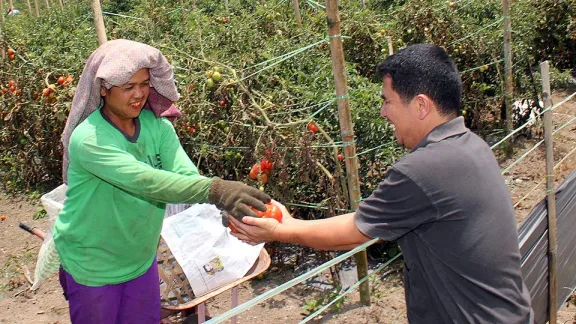
A Muslim farmer in Pardamean village North Sumatra, gives a bunch of tomatoes to Indonesian Lutheran pastor Rev. Liharson Sigiro (right). © LWF/Anto Akkara
Religious Leaders’ Voice Urged in the Call for Bread, Freedom and Social Justice
Farmer Jaya Hotman Turnip used to struggle every year when the rains came.
“I was always short of funds and could never cultivate our entire ancestral land,” Turnip said recently at his maize farm at Pardamean, a remote village in the North Sumatra province of Indonesia.
“But since the credit union was formed here, our lives have become very comfortable,” said Turnip, standing next to his brothers and farm assistants drying maze in an open area next to his house.
After the Simalungun Protestant Christian Church (GKPS) launched a credit union at the village in 2008, Turnip took out a loan of Indonesian Rupiah -IDR 5 million (at the time, USD 550).
“With that money, I was able to cultivate the entire 15 hectare for the first time. I could also buy fertilizers without going to money lenders,” Turnip explained.
His story was one of many micro-credit successes that came to light as Christians and Muslims from India, Indonesia, Malaysia, Namibia, the United States and the Netherlands met at Medan, Indonesia, 12-17 March to develop common strategies on how society can work for the common good.
The Lutheran World Federation (LWF) consultation jointly organized with the LWF National Committee in Indonesia and the Muhammadiyah University of Yogyakarta focused on the topic “Toward a Democratic Polity and the Common Good.”
In a statement issued at the gathering, which included visits to local micro-credit projects, the 40 participants urged faith communities to inspire hope and work for a better, more prosperous and just society. Religions should monitor governments and corporations to see that they are democratic and just, they stated.
Participants urged faith groups to provide direct assistance and empowerment to marginalized people and communities through services such as credit unions, micro-financing, Islamic community banking, training and healthcare.
Careful at First
At Marihat Baru village, *Warsito, a landless laborer, explained how these services helped him forge a new life with his wife Suwarni and two children when they migrated to the farming area of Pardamean, 120 kilometers from Medan, in 2004.
“I used to borrow money from money lenders at high interest to cultivate land on lease here,” said the 32-year old Muslim as he sat inside the home of a Christian neighbor.
After joining the GKPS credit union, which then had four dozen Christian members, Warsito took out a loan of IDR 3 million (USD 330) and expanded his farming business by taking more land on lease.
“With the profit from successive years, I have bought a hectare of land and built [my] house,” Warsito said.
Suwarni recalled that the Muslim family was “very careful” when they first came to the Christian area, and had only minimum interaction with the Christians.
“But after we joined the credit union, the relationship has become very friendly. We now feel like one family,” said Suwarni.
Her parents, Sutrisno and Waginem, have also moved to the village from their home at Pematang, which is 60 kilometers away.
“I feel very happy and comfortable here living among Christian families. It is the credit union that has brought us together,” noted Sutrisno, who has bought two hectares of land in the village. Half of the dozen Muslim families now living in the area are members of the GKPS-run credit union, he said.
Rev. Liharson Sigiro, director of the Credit Union Modifikasi (CUM) of the GKPS that is named “Talenta” (Talent), said that the Lutheran church has 110 village chapters with over 7,000 members in the region.
More than four dozen Muslims are members in the CUM units. There is also an exclusive Roman Catholic chapter at Sipolin, under the GKPS. “Since the CUM was launched in 2007, our credit union has been growing steadily. Our aim is to have one chapter in every pastorate,” he added.
Handsome Dividends
CUM officials said that while two percent interest is charged on outstanding amounts every month, half of this is returned to the members at the end of each year. Profits from each CUM chapter are used to support funerals, weddings and medical emergencies of the members, and to organize training programs.
Rev. Syahrudin Sinaga, director of the CUM regional office at Simalungun, explained that the expansion of the credit union does not require any financial commitment from the church. “The congregation members contribute to the initial capital and they get handsome dividends for it.” The groups, he added, have also created a “new social bond” in the farming community.
“Our credit union chapter has 63 families. Earlier there was not much unity among us. But now we are like a family. We discuss concerns of each other at the monthly credit union meetings,” explained Nurdui Purba, a GKPS member of the CUM chapter at Marihat Baru village.
“Though there is competition (in farming) among us, our families are living peacefully with greater mutual sharing,” said Purba, who has switched to coffee cultivation after obtaining a loan from the credit union.
Counseling Services
The CUM Simalungun office also offers counseling and prayer sessions for credit union members. “During the counseling of couples we have been able to restore peace in the families along with financial stability,” noted counselor Cahaya Munthe.
This approach has significantly eased the pastors’ workload. “In areas where there is a credit union, there are far fewer family problems and disputes,” said Rev. Jankris Harinato Sinaga, a GKPS pastor in Raya town, where CUM coordinates 43 units with over 2,600 members.
“Being members in the credit union, they are also very cooperative and regularly attend church services,” he added. (952 words)
[*In some cases, first names have been used upon request.]
(By LWI correspondent Anto Akkara)


